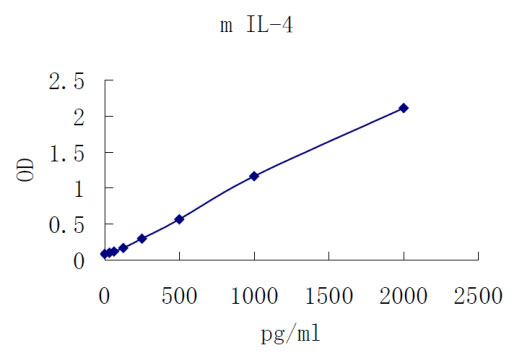Product Detail
Product NameMouse IL-4 ELISA kit
ApplicationsELISA
Species ReactivityMs
SpecificityNatural and recombinant Mouse IL-4 Ligand
Target NameMouse IL-4
Application Details
Detect Range: 0.03 - 2.0 ng/mL
Sensitivity: 15pg/mL
Sample Type: Cell culture supernatant, serum, plasma (EDTA, citrate, heparin)
Sample Volume: 20 uL
Assay Time: 3 hour
Detection method: Colorimetric
Interleukin 4 (IL-4) is a pleiotropic cytokine produced primarily by activated T lymphocytes, mast cells and basophils (1-3).
The cDNA sequence of mouse IL-4 predicts a 140 amino acid (aa) residue precursor protein containing a 20 aa residue signal peptide that is cleaved to form the mature protein (4). At the amino acid sequence level, mature mouse IL-4 is approximately 50% identical to human IL-4 but there is no species cross-reactivity for biological activity for the two proteins (1, 2). Mouse IL-4 also shares approximately 30% amino acid sequence identity to mouse IL-13 and the two cytokines exhibit overlapping biological activities (5, 6). The gene for IL-4 has been mapped to mouse chromosome 11, in close proximity to the genes for IL-3, IL-5, IL-13 and GM-CSF (1, 2).
IL-4 has multiple immune response-modulating activities on a variety of cell types. It is an important regulator of isotype switching, inducing IgE production in B lymphocytes. It is an important modulator of the differentiation of precursor T helper cells to the Th2 subset that mediates humoral immunity and modulates antibody production. In addition, IL-4 has also been shown to have anti-tumor activity both in vivo and in vitro (1-3).
The biological effects of IL-4 are mediated by specific cell surface receptor complexes. Although IL-4 R does not bind IL-13 directly, it has been shown to complex with the low-affinity IL-13 R to form the functional high-affinity receptor complex for IL-13 (7, 8). In addition to the membrane-bound form of IL-4 R, a naturally occurring soluble form of IL-4 R has been identified in human and mouse biological fluids and in mouse cell culture supernates (9-11). Soluble IL-4 R has been to shown to bind IL-4 with high affinity in solution.
If you have published an article using product EK0498, please notify us so that we can cite your literature.
et al,Immune and Metabolic Regulation Mechanism of Dangguiliuhuang Decoction against Insulin Resistance and Hepatic Steatosis.In Front Pharmacol on 2017 Jul 7 by Hui Cao , Lingling Tuo,et al..PMID: 28736524
, (2017),
PMID:
28736524
et al,Targeting the AKT-P53/CREB pathway with epicatechin for improved prognosis of traumatic brain injury
, (2023),
PMID:



 YES
YES



